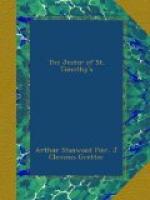“When, Mr. Upton?” “Does he think they’ll come?” “Does Lou Collingwood know about it?”
“I guess he knows as much as I do.” Irving tried to answer the flood of questions. “He wrote officially to the captain at the same time that I wrote to Lawrence. If they come at all, it will be about a week before the St. John’s game.”
“When shall we know for sure?” asked Westby.
“It appears to be a question whether the Freshmen will choose to play us or Lakeview School. They want to play whichever team seems the stronger, and they’re going to discuss the prospects and decide in a few days.”
“I’m sure we’re better than Lakeview,” declared Blake. “You’ll tell your brother we are, won’t you, Mr. Upton?”
“I’ll tell him that I understand we have a very superior team,” said Irving. “I fancy he knows that it’s as much as I can do to tell the difference between a quarterback and a goal post.”
“You will admit, then, that there was some reason for my not believing you had a football brother, won’t you, Mr. Upton?” Westby tried thus to beat a not wholly inglorious retreat.
“Every reason—until it became a matter of doubting my word,” said Irving.
Westby crimsoned, and Irving felt that again he had been too severe with him; the boy had been trying to convey an apology, without actually making one; it might have been well to let him off.
But Irving reflected that the account was still far from even and that perhaps this unwonted adversity might be good for Westby. Irving did not realize quite how much teasing had been visited upon Westby in consequence of his disastrous error, or how humiliated the boy had been in his heart. For Westby was proud and vain and sensitive, accustomed to leadership, unused to ridicule; for two days now the shafts of those whom he had been in the habit of chaffing with impunity had been rankling. Because of this sensitive condition, the final rebuke at the luncheon table, before all the boys, cut him more deeply than Irving suspected. Afterwards Westby said to Carroll,—
“Oh, very well. If he couldn’t accept my acknowledgment of my mistake, but had to jump on me again—well, it’s just spite on his part; that’s all. I don’t care; I can let him alone after this. That seems to be what he wants.”
“A month ago he wouldn’t have asked more than that of you,” observed Carroll. “And you didn’t feel like obliging him then.”
The implication that Irving had worsted him galled Westby.
“Oh,” he retorted, “the best of jokes will wear out. Kiddy was a perfectly good joke for a while—”
Carroll annoyed him by laughing.
For one who had hitherto been indifferent to all forms of athletics, Irving developed a surprising interest in the game of football. Every afternoon he went to the field and watched the practice of the Pythian and Corinthian elevens. He had once thought the forward pass a detail incapable of engaging one’s serious attention, and worthy of rebuke if attempted in dormitory; but after Lawrence wrote that in executing it he was acquiring some proficiency, Irving studied it with a more curious eye.




